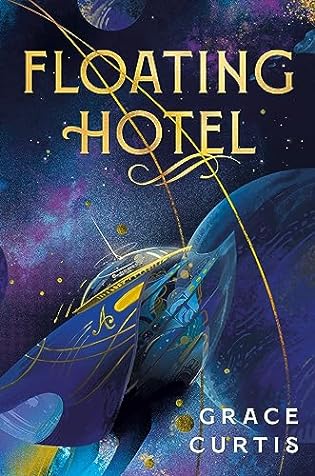 Floating Hotel by Grace Curtis
Floating Hotel by Grace Curtis Format: eARC
Source: supplied by publisher via NetGalley
Formats available: hardcover, ebook, audiobook
Genres: mystery, science fiction, science fiction mystery, space opera
Pages: 304
Published by DAW on March 19, 2024
Purchasing Info: Author's Website, Publisher's Website, Amazon, Barnes & Noble, Kobo, Bookshop.org, Better World Books
Goodreads
This cozy debut science fiction novel tells a story of misfits, rebels, found family—and a mystery that spans the stars
Welcome to the Grand Abeona home of the finest food, the sweetest service, and the very best views the galaxy has to offer. All year round it moves from planet to planet, system to system, pampering guests across the furthest reaches of the milky way. The last word in sub-orbital luxury—and an absolute magnet for intrigue. Intrigues such Why are there love poems in the lobby inbox? How many Imperial spies are currently on board? What is the true purpose of the Problem Solver’s conference? And perhaps most pertinently— who is driving the ship?
Each guest has a secret, every member of staff a universe unto themselves. At the center of these interweaving lives and interlocking mysteries stands Carl, one time stowaway, longtime manager, devoted caretaker to the hotel. It’s the love of his life and the only place he’s ever called home. But as forces beyond Carl’s comprehension converge on the Abeona, he has to face one final when is it time to let go?
My Review:
The Grand Abeona, the ‘floating hotel’ of the title, isn’t quite as grand as it used to be. Both as a place and as a story, It also isn’t quite as cozy as the blurb leads the reader to believe. Which does, however, make it much more interesting as a story.
It’s more layered than cozy, rather like an onion. Complete with tears.
Traveling through Imperial-controlled space, the Grand Abeona serves the function that once upon a time the circus used to fill in small town America. It’s a place that blows into town – or above town, as the case might be – livens up an otherwise humdrum life for a few hours or days, and then leaves, taking its crew of roadies and roustabouts along with it.
Along with, occasionally, a local or two who can’t resist the bright lights or can’t bear or afford to stay where they’ve always been for another minute, now that they’ve seen a way out.
So, the story of Floating Hotel begins with young Carl, who doesn’t so much stow himself away as he does slouch around in plain sight hoping for a chance to work his way aboard the most beautiful place he’s ever seen and away from his home planet. A place that is literally eating itself from the inside out as its people mine its resources to their own and its destruction under the orders of the rapacious empire.
Because they have no choice. It’s mine now and die later, or stop now and die now. It’s happened all over the empire and it’s happening right now on Hoxxes. But not to Carl, because he’s found a way out.
Middle-aged Carl is now the manager of the Grand Abeona, and that later he staved off all those years ago by leaving with the floating hotel is now coming for him and everyone aboard the place he’s come to call home. The place that he has let consume him, one day and one task at a time.
So welcome aboard the last voyage of the Grand Abeona. Be sure to take your heart and all your belongings with you on your way out.
Escape Rating B: This isn’t nearly as cozy as I was expecting from both the blurb AND the opening Prologue. That introduction makes it seem like its going to be Carl’s story about rising through the ranks of the hotel and that it will follow him along the way.
It isn’t and it doesn’t. While Carl opens the story – and also closes it – we absolutely don’t follow his rise through the ranks. He’s already there when the real story begins. We also don’t follow Carl, although he’s clearly the center around which the hotel revolves – even if no one quite sees him that way.
Instead, the story skips around through the crew and the regular guests, focusing on one after another as the saga of the ship’s last voyage gets told. That kaleidoscope of perspectives keeps the reader from getting invested in any one of the characters, but does show all of the facets of the hotel as it is – and pokes its way around the edges of the many, many secrets that are being kept aboard her.
One ginormous, galaxy-spanning secret most of all.
On the one hand, we have the ship and its denizens, each telling their individual bit of the story. And on the other, we have the ship and its denizens, each revealing a bit of their own secrets, as well as a soupçon of the BIG secret, while painting an excruciatingly unflattering portrait of the Empire they have escaped by becoming part of the ship’s company.
Initially believing that this was going to be cozier, The Floating Hotel gave me vibes of several recent SF stories that featured, or began with, entertainment venues in the space lanes, even if they branched out later into either mystery or space opera. I’m particularly thinking of The Spare Man, You Sexy Thing, and Veronica Scott’s Star Cruise series.
In the end, the SF book I was most reminded of is Khan Wong’s awesome The Circus Infinite, although I have to say that The Floating Hotel isn’t quite as awesome because The Circus Infinite was just a WOW of a book from beginning to end. (Therefore, saying it’s not quite as awesome as such an absolutely fantastic book means it was still pretty damn good.)
But it’s in that correlation between the circus and the cruise ship that gives the two a bit of the same resonance, as both stories begin with a character who desperately needs the kind of escape that constant traveling among the stars can provide, and finds themselves in a world that is filled with more secrets than just their own. Secrets that they will have to go to extreme lengths to keep.
So if you liked any of the above mentioned books, or if you have fond memories of either the very old book Hotel by Arthur Hailey, or the slightly less old TV series based on it, The Floating Hotel will both tickle that memory AND tell a fascinating story about the lengths that can be taken in running away and the crimes that can be committed in forcing someone back to the place they’re supposed to belong.

 Like Thunder (The Desert Magician's Duology #2) by
Like Thunder (The Desert Magician's Duology #2) by  Escape Rating A-: As much as I loved
Escape Rating A-: As much as I loved  Valdemar (The Founding of Valdemar #3) by
Valdemar (The Founding of Valdemar #3) by  This final book in the
This final book in the  Escape Rating A: Valdemar has always been a bit of an anomaly as far as fantasy worlds go. Most epic fantasies are set at times and in places that are in so much turmoil that that are just no nice places to visit and you really wouldn’t want to live there. There are a few exceptions, like Pern, Celta and Harmony, but for the most part, by the time that an epic fantasy series gets written about a place – or epic space opera or a combination thereof – the situation has gotten so FUBAR that liveability is a long way off even by the series’ end.
Escape Rating A: Valdemar has always been a bit of an anomaly as far as fantasy worlds go. Most epic fantasies are set at times and in places that are in so much turmoil that that are just no nice places to visit and you really wouldn’t want to live there. There are a few exceptions, like Pern, Celta and Harmony, but for the most part, by the time that an epic fantasy series gets written about a place – or epic space opera or a combination thereof – the situation has gotten so FUBAR that liveability is a long way off even by the series’ end. It is generally a two-steps forward, one-step back proposition. We know that sausage is going to be fairly tasty by the time it reaches Queen Selenay in
It is generally a two-steps forward, one-step back proposition. We know that sausage is going to be fairly tasty by the time it reaches Queen Selenay in 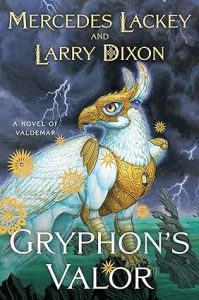 The tributes to Sydney-You-Asshole’s death were many and heartfelt, particularly deeply touching to the heart of any reader who has a beloved companion animal that is gone. There is still dust in this review as I write about it – so be prepared.
The tributes to Sydney-You-Asshole’s death were many and heartfelt, particularly deeply touching to the heart of any reader who has a beloved companion animal that is gone. There is still dust in this review as I write about it – so be prepared. Anything With Nothing (Tales of Valdemar #17) by
Anything With Nothing (Tales of Valdemar #17) by  Escape Rating A-: The previous
Escape Rating A-: The previous  Many of the stories in this collection take place either as magic was fading or after it was already gone. In other words, in the run up to the
Many of the stories in this collection take place either as magic was fading or after it was already gone. In other words, in the run up to the  Last but not least, there are several marvelous stories in this collection that would have been equally at home in
Last but not least, there are several marvelous stories in this collection that would have been equally at home in  Shadow Speaker (The Desert Magician's Duology, #1) by
Shadow Speaker (The Desert Magician's Duology, #1) by 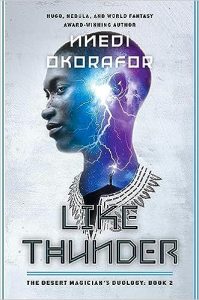 Which means that while the narrator, Délé Ogundiran, does an excellent job of standing in as Ejii’s voice, that may not be true for the second book in the duology, which will be Dikéogu’s story. Hopefully by the point in Dikéogu’s life when that story takes place, his voice will have dropped.
Which means that while the narrator, Délé Ogundiran, does an excellent job of standing in as Ejii’s voice, that may not be true for the second book in the duology, which will be Dikéogu’s story. Hopefully by the point in Dikéogu’s life when that story takes place, his voice will have dropped. A Study in Sable (Elemental Masters #11) by
A Study in Sable (Elemental Masters #11) by  I read A Study in Sable AFTER I finished
I read A Study in Sable AFTER I finished 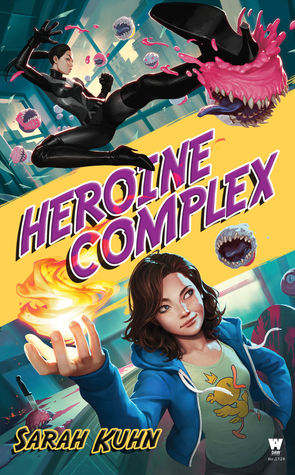 Heroine Complex (Heroine Complex, #1) by
Heroine Complex (Heroine Complex, #1) by  Because way back when Evie Tanaka and Annie Chang were girls watching Michelle Yeoh in the Hong Kong fantasy adventure superhero movie
Because way back when Evie Tanaka and Annie Chang were girls watching Michelle Yeoh in the Hong Kong fantasy adventure superhero movie  Revisionary (Magic Ex Libris, #4) by
Revisionary (Magic Ex Libris, #4) by 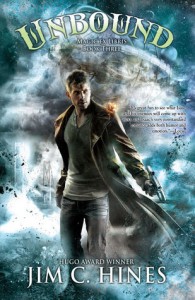 I dove into Revisionary the second I finished
I dove into Revisionary the second I finished  An Ancient Peace (Peacekeeper, #1) by
An Ancient Peace (Peacekeeper, #1) by 